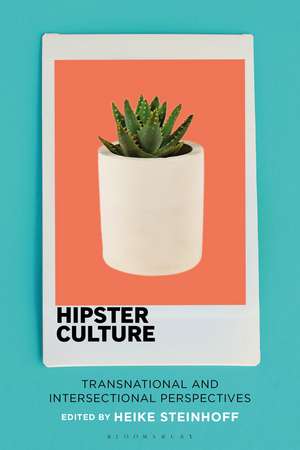Hipster Culture: Transnational and Intersectional Perspectives
Editat de Heike Steinhoffen Limba Engleză Paperback – 8 sep 2021
Preț: 225.36 lei
Preț vechi: 278.90 lei
-19% Nou
Puncte Express: 338
Preț estimativ în valută:
43.12€ • 45.03$ • 35.61£
43.12€ • 45.03$ • 35.61£
Carte disponibilă
Livrare economică 25 martie-08 aprilie
Preluare comenzi: 021 569.72.76
Specificații
ISBN-13: 9781501370410
ISBN-10: 1501370413
Pagini: 432
Ilustrații: 7 bw illus
Dimensiuni: 152 x 229 mm
Greutate: 0.73 kg
Editura: Bloomsbury Publishing
Colecția Bloomsbury Academic
Locul publicării:New York, United States
ISBN-10: 1501370413
Pagini: 432
Ilustrații: 7 bw illus
Dimensiuni: 152 x 229 mm
Greutate: 0.73 kg
Editura: Bloomsbury Publishing
Colecția Bloomsbury Academic
Locul publicării:New York, United States
Caracteristici
Approaches the hipster from a variety of perspectives, including class, race, gender, and sexuality
Notă biografică
Heike Steinhoff is Junior Professor of American Studies at Ruhr-University Bochum, Germany. She is the author of Transforming Bodies: Makeovers and Monstrosities in American Culture (2015) and Queer Buccaneers: (De)Constructing Boundaries in the Pirates of the Caribbean Film Series (2011). She has also published articles on representations of the body, gender, sexuality, and space in American literature and film.
Cuprins
Acknowledgements List of Illustrations 1. Hipster Culture: A Definition Heike Steinhoff (Ruhr-University Bochum, Germany) Part I: Hipster Places, Identities and Transformations 2. (Re-)Dressing the Naked City: Hipsters, Urban Creative Culture, and Gentrification in New York City Annabel Friredrichs (Leibniz University, Germany) and Florian Groß (Leibniz University, Germany) 3. Glocal Hispsterification: Hipster-Led Gentrification in New York's, New Delhi's and Johannesburg's Cultural Time Zones Melissa Tandiwe Myambo (University of the Witwatersrand, South Africa) 4. Hipsters in Central and Eastern Europe: FromDomesticated Nostalgia to Manele and Protests George Alexandru Condrache (University of Western Ontario, Canada) 5. Pastiching the Pastoral: Hipster Farmers and the Commodification of American Agriculture Katje Armentrout (Purdue University, USA) Part II: Hipster Fashion, Porn, and Body Politics 6. Hipster (Anti-)Fashion Catharina Rüß (TU Dortmund University, Germany) 7. The Irony of Hipster Beards Christopher Oldstone-Moore (Wright State University, USA) 8. The Politics of Hipster Porn/ography Alexandra Hauke (University of Vienna, Austria) and Philip Jacobi (University of Passau, Germany) Part III: Hipster Literature and Self-Fashioning 9. Twenty-First Century Hipster Fiction and Postindustrial Revitalization Brandon McFarlane (Sheridan College, Canada) 10. Choosing Marginality: White Entitlement in Dave Eggers' Hipster Fiction Stephanie Li (Washington University in St. Louis, USA) 11. The Line, the Niche, and the Bathrobe: The White Male Writer as a Hipster Trope Katharina Scholz (Journalist, Germany/Ireland) 12. "The Straight Queer": Hipster Appropriation in the Work of James Franco Ben Robbins (University of Innsbruck, Austria) Part IV: Hipster Media, Aesthetics and Identity Politics 13. The Female Hipster in Girls and Frances Ha and the Potential of Emancipated Spectatorship Heidi Liedke (University of Koblenz-Landau, Germany) 14. "Fem the Future" of Hipness: Female Hipster Performers in Twenty-First Century Popular Music Lena Gotteswinter (Friedrich-Alexander-University Erlangen-Nuremberg, Germany) 15. Art Hipsters: Postmodern Proclamations Wes Hill (Southern Cross University, Australia) 16. Hipster Post-Communities and Digital Nostalgia Design Marek Jezinski (Nicolaus Copernicus University, Poland) and Lukasz Wojtkowski (Nicolaus Copernicus University, Poland) Part V: Hipster Foodways and Cultural Politics 17. The Pursuit of Culinary Capital in Portlandia and Master of None Justine Gieni (University of Regina, Canada) 18. Pabst Blue Ribbon: The Hipster Experiment with Critical Anti-Consumerism in Beer and Beyond Daniella Gáti (Brandeis University, USA) 19. The Paradox of the Hungry Hipster: The Representation and Cultural Politics of Hipster Foodways Kathleen LeBesco (Marymount Manhattan College, USA ) and Peter Naccarato (Marymount Manhattan College, USA) Part VI: Hipsters as Intersectional Identities 20. Mipsterz: Cultural Capital, Racialization, and the Emergence of Muslim Cool Anwar Ouassini (Delaware State University, USA ) and Mostafa Amini (Harvard Medical School, USA) 21. Skinny Jeans in the Sanctuary: The Hipster Christian Subculture Caroline Barnett (First Presbyterian Church of Auburn, USA) 22. The Hipster Animal: Human-Animal Interactions in Hipsterdom Jayson Scott Grimes (Independent Scholar, Germany) Index
Recenzii
This collection embraces a true cultural studies approach to the figure of the hipster. Covering everything from foodways to fashion, the collection situates the hipster's unique place in American subculture, while simultaneously placing the hipster in larger global contexts. Of note is the collection's intersectional approach to the topic, exploring the hipster from a number of gendered, sexual, and religious perspectives, expanding the uses of this collection to broader studies of identity, consumption, and consumerism.
This is a worthwhile study that fills a gap in the existing literature on hipsters by looking at the subject from various perspectives. By drawing attention to hipster involvement in identity politics, fashion, food, literature and visual culture, the book covers some new ground while adding to existing studies, and viewing the hipster beyond the lens of western culture is a particular strength. Very interesting and timely - a valuable resource for anyone teaching cultural studies, sociology, fashion history and theory, media studies and more.
This is a worthwhile study that fills a gap in the existing literature on hipsters by looking at the subject from various perspectives. By drawing attention to hipster involvement in identity politics, fashion, food, literature and visual culture, the book covers some new ground while adding to existing studies, and viewing the hipster beyond the lens of western culture is a particular strength. Very interesting and timely - a valuable resource for anyone teaching cultural studies, sociology, fashion history and theory, media studies and more.
